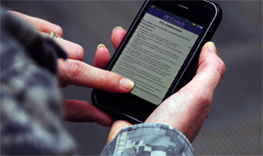Pokemon GO: An Annoying Win for Mental Health
As both a psychologist and a gamer, I’m thrilled with the success of the mobile app Pokemon GO, the location-based, augmented reality game where players use their smartphones to locate virtual Pokemon characters in real-world locations. I’m guessing that you’re either playing the game yourself or have run across players. And I mean that literally: the game can be so absorbing that players walk into pedestrians, crash into police cars and have even been robbed. Sounds annoying, right? Yes—we do look ridiculous swiping pokeballs at invisible cartoons. However, Pokemon GO and other immersive mobile games like Ingress and Zombies, Run! have been a win for mental health.
 The clearest value for users of these games is increased physical activity, which is also good for your mental state. The best way to get to a higher level is by going outside and walking. Although some features of the apps work while driving, only by walking can Pokemon GO players “hatch eggs” and Ingress players collect “exotic matter.” Parents of Pokemon GO players share stories of their kids walking miles every day of summer break, limited only by their external battery packs. An Air Force veteran is even crossing America on foot, bicycle and bus to play the game to raise awareness and support for the Wounded Warrior Project.
The clearest value for users of these games is increased physical activity, which is also good for your mental state. The best way to get to a higher level is by going outside and walking. Although some features of the apps work while driving, only by walking can Pokemon GO players “hatch eggs” and Ingress players collect “exotic matter.” Parents of Pokemon GO players share stories of their kids walking miles every day of summer break, limited only by their external battery packs. An Air Force veteran is even crossing America on foot, bicycle and bus to play the game to raise awareness and support for the Wounded Warrior Project.
For individuals with limited social connections, Pokemon GO is an easy entry into a friendship. There is a clear comradery among players, as most of the game play isn’t competitive. The game also offers conversation starters: “What level are you?” “Have you caught anything good today?” “What’s your team?” There’s also a feature called “lures,” where a player can set a particular geographic location to lure Pokémon for 30 minutes. And where the Pokemon go, so do the players. Users often set lures at public parks and other places where it’s easy to congregate, providing great opportunities to chat, brag and form relationships.
A hidden benefit of games like Pokemon GO is the behavioral activation. Individuals with depression often lack the motivation to engage in pleasurable and healthy activities, especially activities that force them to leave their homes. For patients experiencing a depressed mood, the reward system that is activated in the ventral striatum can help provide that motivation. In other words, catching Pokemon, capturing Ingress portals, and running from Zombies actually does make us feel good. This pleasure is a strong motivator and can work within a treatment that includes pleasant event scheduling. If you are using T2’s Virtual Hope Box or Positive Activity Jackpot app to help patients with depression, remind them they can add mobile games to the list of pleasant activities.
So if your patients are immersed in Pokemon GO, I recommend encouraging the activity along with a few caveats. Remind them to play while walking (NOT driving). Ask them to stay in safe areas and consider playing as a group. And most important: if they see a Pikachu, tweet at me ASAP.









